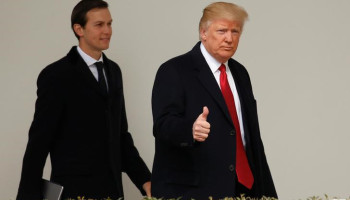
By Timothy L. O’Brien
After a week that began with the FBI disclosing that it’s investigating President Donald Trump’s campaign team for possibly colluding with Russia to tilt the 2016 election, and ended with a devastating legislative debacle on health care, the president decided to regain momentum by launching his 36-year-old son-in-law into the fray.
Jared Kushner, according to a Washington Post account, will oversee a new “SWAT team” to be unveiled on Monday. Its goal is to reinvent the federal government. The entire federal government. Trump has already tasked Kushner with bringing peace to the Middle East (“If you can’t produce Middle East peace, nobody can,” Trump said to him during a ball on Inauguration eve), and his West Wing portfolio includes other significant domestic and foreign policy assignments.
Kushner is chipper about his new assignment, and, given that his entire experience in public administration can be counted on two calendar pages, a wee bit precious as he dispenses advice.
“We should have excellence in government,” he allowed. “The government should be run like a great American company.”
Kushner and his father-in-law haven’t run the White House like even an average American company thus far, but with the Trumps, hope springs eternal.
Kushner’s new Office of American Innovation will reportedly showcase a number of corporate titans, including Apple’s Tim Cook and Microsoft’s Bill Gates, all of whom, among other things, will make recommendations about how to make government more tech-savvy and more data-centric.
It’s hard not to get behind any plan that makes government more effective and tries to use data instead of, say, raw ideology to help craft better policy decisions. So let’s wish the White House success.
In fact, let’s toast Trump and Kushner as fast as we can, because they’re going to need all of the help they can get if this nod toward innovation is going to amount to anything more than a head fake.
After all, it’s not clear that they even understand how the bureaucracy they’re steering functions. Hundreds of vacancies remain among the federal agencies that Team Trump is supposed to staff (of the 553 positions Trump has to fill in the executive branch, only 61 have been or are about to be filled; 492 await nomination).
Given the administration’s anti-government, anti-process, anti-matter approach to public service, maybe that’s the way they like it.
If that’s the case, then there’s not much need to innovate. The influential White House strategist Steve Bannon has vowed a fight for the “deconstruction of the administrative state,” which seems more consistent with letting government functions rot than with making them function more smoothly.
Innovation is, of course, research-dependent, and branches of the government that have engaged in research in the past — such as the National Institutes of Health, the Department of Energy, and the National Aeronautics and Space Administration — are on the chopping block in Trump’s budget proposal. Research may not be the kind of innovation Kushner has in mind, though. He may just be using “American Innovation” to mean “Smaller, Cheaper Government.”
If that’s the case, then Kushner and his wife’s father could take a cool, calculating look at how to make government contracting more transparent and effective. Would that include the way the General Services Administration just approved the lease on the family hotel in Washington? Would the millions of taxpayer dollars being spent weekly protecting the president’s multiple residences and his family’s trips to golf courses, clubs and other business locales owned by the Trumps wind up under a cost-benefit microscope?
“I promised the American people I would produce results, and apply my ‘ahead-of-schedule, under-budget’ mentality to the government,” Trump said in a statement accompanying news of Kushner’s new job.
Let’s pause on that thought for a moment to note that the president hasn’t had a bulletproof record on the “ahead-of-schedule-and-under-budget” front during his long and checkered business career. (Trump sued me for libel in 2006, claiming that my 2005 biography of him, “TrumpNation,” had damaged his reputation and business prospects. He lost the case in 2011.)
Trump’s first big Manhattan development, the Grand Hyatt Hotel, landed late and about $50 million over budget in 1980 — primarily due to cost overruns associated with the building’s design. Trump’s first big Atlantic City casino, Harrah’s at Trump Plaza, opened in 1984 at least $70 million over budget. His last big casino, the Taj Mahal, was over budget and so larded with unmanageable debt when it opened in 1990 that it landed in bankruptcy protection a year later.
Trump’s business career has also been plagued with managerial snafus and poor deal-making offset by tireless marketing and energetic self-promotion. All of Trump’s shortcomings that surfaced last week in the health-care debate — a lack of attention to detail, the assumption that charisma could make up for weak team-building, a lack of strategic thinking, prioritizing publicity and spin over substance, an unwillingness to take responsibility for his own mistakes, and impatience — are the same shortcomings that have haunted Trump throughout his career.
Trump is also learning that policymaking in Washington isn’t the binary experience that has characterized some of his relatively modest deal-making over the years. Politicians can feel more responsible to their constituents or their values or their own survival than to an efficiency-minded president with an outsized ego.
Still, Kushner is an optimist about his new gig, and he sees it as more than window dressing (or, perhaps, as a distraction from the chaos the White House landed in last week).
“Our hope is that we can achieve successes and efficiencies for our customers, who are the citizens,” he told the Washington Post, in a cheerful bit of consultant-speak.
Maybe. But while Jared’s new project appears to be Jared’s, he’ll be reporting to the president. That means that the Office of American Innovation will become part of the circus.
BLOOMBERG

Leave a Reply
You must be logged in to post a comment.